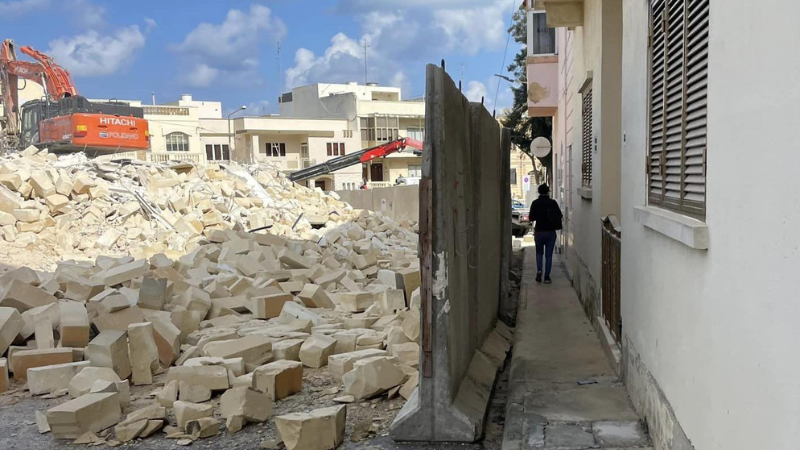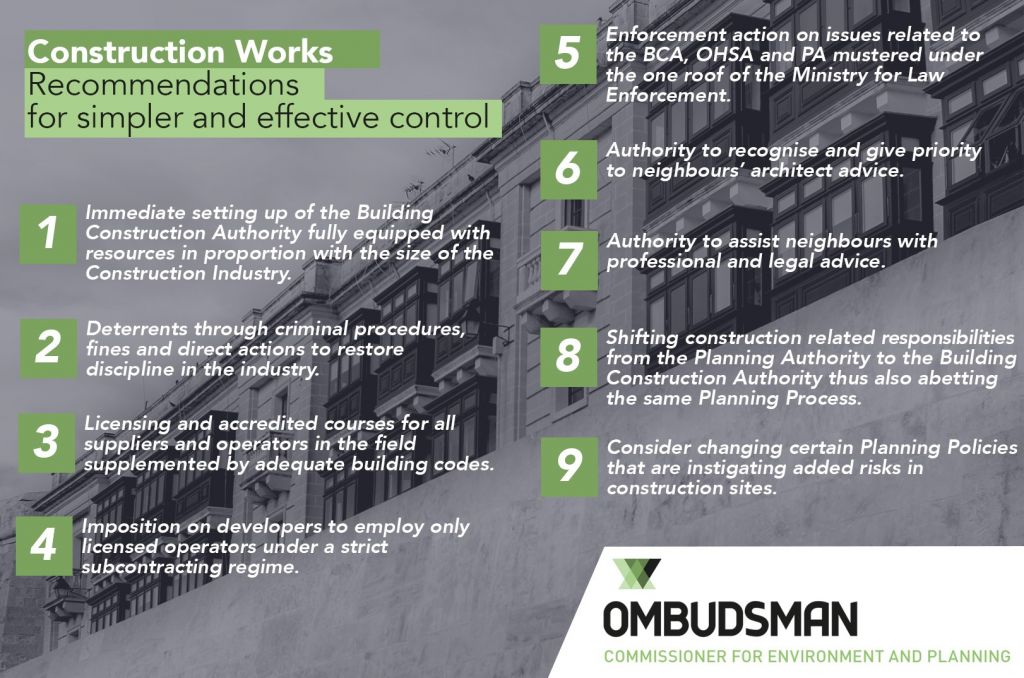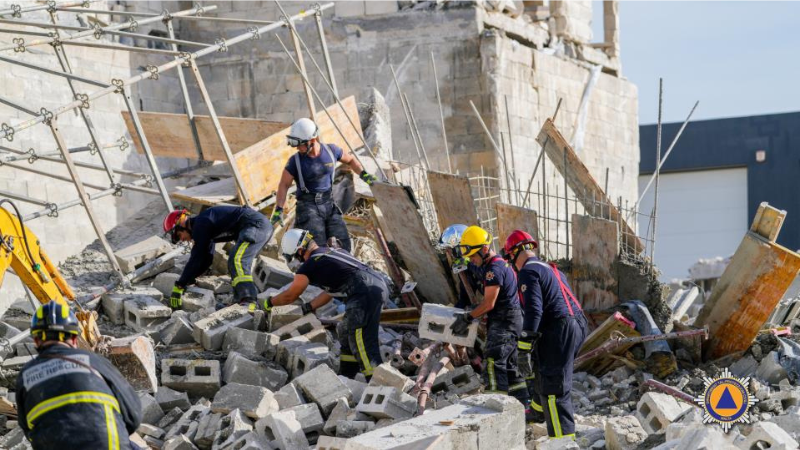Three years after the government’s commitment to implement change in the monitoring and management of the construction industry in the wake of Miriam Pace’s death, Prime Minister Robert Abela shrugged off calls on Wednesday for a public inquiry into Jean Paul Sofia’s death despite widespread criticism.
The prime minister announced that Cabinet had approved a licensing framework for contractors in building projects – a move that many feel was too little too late considering that reform was promised since at least 2019. More people have died since then due to inaction by the government.
Answering questions on Wednesday while announcing the Cabinet’s approval of the licensing framework, the prime minister said, “a public inquiry hinders and does not help achieve justice”.
The statement echoes the stand taken by disgraced former prime minister Joseph Muscat when he insisted on resisting a public inquiry into the assassination of journalist Daphne Caruana Galizia. An inquiry concluded that the State was responsible for her death and recommended reforms the present government continues to resist.
Sofia died in a building collapse last December, just over three months ago. He was working in what was to be a timber factory constructed illegally on government property and Maltese developers with a criminal past and connections to the Lands Authority. Sofia was 20 years old.
Pace died when her home collapsed in March 2020. The collapse came as a result of excavation works at an adjacent property. Such excavation practices were later described as “playing Russian roulette with the lives of third parties” in a report by a four-person technical committee set up in the wake of Pace’s death.
The government has promised change within the construction industry for years, with Ian Borg promising to start implementing the licensing of contractors by the end of 2019, predating both Sofia and Pace’s avoidable and tragic deaths.
The report on Pace’s death was completed in April 2020 but was not published until January 2021, ten months after Pace’s death. Prime Minister Robert Abela had initially refused to publish it but bowed to public pressure and criticism. One of the report’s key recommendations was the setup of a Building and Construction Authority.
The BCA, introduced through the Building and Construction Authority Act in 2021, replaced the older Building and Construction Agency, established in 2019, and the Building and Regulation Office.
The Authority has been plagued by scandals and conflicts of interest, most recently when its former chairperson served as the architect of a dangerous building demolition site in Birkirkara.
BCA members regulate themselves
The BCA’s former chairperson, Marisa Schembri Grima, has been closely linked with controversial construction magnate Joseph Portelli, serving as his architect on a third of all applications filed under her name in 2021.
One of these projects was a demolition site at the former GO exchange office in Birkirkara. The demolition led to health and safety concerns and a public outcry leading to Schembri Grima’s resignation as BCA chair.
Hours after her resignation, a stop notice was finally issued for work at the dangerous site.

Dangerous demolition works at a Birkirkara building whose architect was the former BCA chair – Photo: Facebook
Promises of change unfulfilled for years
The government has continually promised change and further regulation for the construction industry, which the Kamra Tal-Periti (Chamber of Architects) has described as “overrun by anarchy”.
Borg had promised a register of contractors to be established, with work on licensing to be started by the end of 2019: “If you do not have a licence, you cannot operate in the industry. This should happen by the end of the year”.
The same promise had been made by parliamentary secretary for construction Chris Agius in January 2021, who had said that the new BCA would lead to contractor licensing.
In November 2022, a month before Sofia’s death, Public Works and Planning Minister Zrinzo Azzopardi also promised that construction contractors would soon require licensing.
Azzopardi restated his claims in February, claiming that a draft law for a contractor licencing system would be published by March 2023. A framework for the licensing of contractors was approved in Cabinet last Tuesday, with licensing to be introduced in the coming days, almost four years after it was first promised.
Besides the setting up of a Building and Construction Authority and the introduction of licensing for construction contractors, additional measures have been recommended by technical committees, the ombudsman’s office and other industry stakeholders, many of which have yet to be implemented or even be discussed by the government.
Dozens of recommendations ignored
The April 2020 technical committee report on Pace’s death called for proof-of-safety checks for excavation and construction works, limiting excavation works to specific hours and proper enforcement of laws.
The concept of a building permit, separate to a planning permit, was also suggested, regulating the methods used to excavate and construct buildings. Site Technical Officers were also found to be lacking in scope and qualification.
In March 2020, the Commissioner for Environment and Planning at the Ombudsman’s Office published a report with refreshed recommendations made in June of the previous year for changes to the out-of-control industry.
Among its nine key recommendations, the report called for licensing and accredited courses for all operators in the industry, a strict subcontracting regime available only to licensed operators and streamlining of enforcement action.

Key recommendations from a 2020 report from the Ombudsman’s office – Photo: Parliamentary Ombudsman
In June 2020, Kamra tal-Periti (Chamber of Architects) also made recommendations in a comprehensive framework based on 10 key principles.
The Chamber called for a separation of building and planning permits, the introduction of an independent engineering auditor for major projects, licensing and classification of contractors, the privatisation of construction site inspectors, compliance certificates and post-occupancy checks.
All three proposals outlined a need for strict enforcement, each calling for independent bodies to act as checks and balances to prevent abuse. The introduction of the BCA sought to implement these changes, but it remained ineffective and controversial.
Calls from families, NGOs and the opposition for public inquiries into both Miriam Pace and Jean Paul Sofia’s deaths have been ignored by Abela’s government, despite such inquiries’ ability to identify systemic issues and points of improvement for the industry, government and legislation.
There have been no significant changes introduced to the construction industry since Miriam Pace’s tragic death more than three years ago.
The Building and Construction Authority has been ineffective in overhauling the industry, as evidenced by the political appointments, dubious direct orders and flagrant conflicts of interest.














The BCA is run by idiots, crooks and a nonsense Minister. Perhaps more scandals are on the line.
A Minister who never answers questions , because he has No Sense of Ethics and Duty.
The ONLY thing that happened was the Minister firing the CEO who tried to rein in the cowboys in the building industry. This ex CEO has taken the Minister the Court. The magistrate who has the case can do the residents of Malta justice by not allowing the Minister and his lawyers to play hide and seek . PLEASE.
There should also be a method of statement sent in by contractors with achievable milestones they must meet as to the construction timeline so it prevents the unnecessary years of noise and dust from small projects and keep them moving in a timely manner to lower the distribution to neighbouring properties